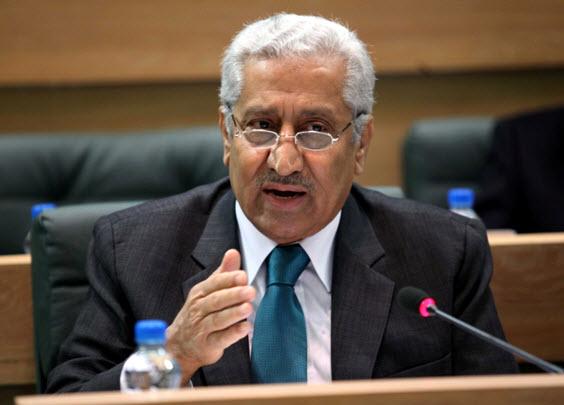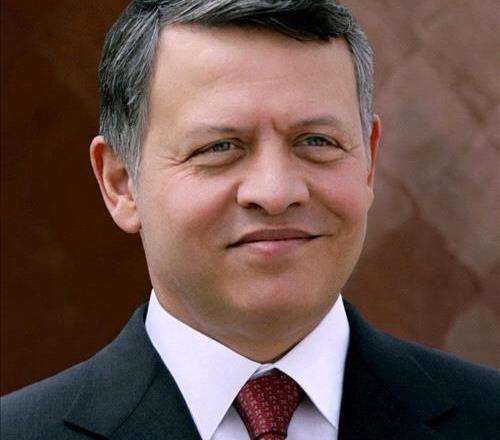You are here
Ensour says economic blueprint to be roadmap for governments to follow
May 03,2014 - Last updated at May 03,2014
Following is the official translation of Prime Minister Abdullah Ensour’s letter to His Majesty King Abdullah on drafting a 10-year economic blueprint:
Your Majesty King Abdullah II ibn Al Hussein,
Leader of the reform process and protector of Jordan and its stability and prosperity,
Peace, God’s mercy and blessings be upon you,
My Cabinet and I have received, with gratitude and honour, Your Majesty’s letter directing the government to draft a 10-year economic blueprint for Jordan. I would like to affirm, Your Majesty, that putting forward full-fledged plans, aimed at enhancing all aspects of the country’s financial and monetary policy and guaranteeing their consistency, improving economic competitiveness and promoting the values of productivity and self-reliance in order to improve citizens’ living standards and ensure a bright future for Jordanian men and women, has been a constant practice and a key goal of this government.
The Cabinet and I assure Your Majesty that we will work diligently to prepare this blueprint, adopting a participatory approach, based on openness to all of the country’s social and economic stakeholders, including government agencies, Parliament, the private sector, civil society organisations and other national entities. Through this approach, the blueprint will be the fruit of a collective national endeavour, where all stakeholders have an active role to play, not only its drafting, but also in the process of its implementation and follow-up. We will work on institutionalising the role of the private sector, to further emphasise the important part it plays in development.
Further, in line with Your Majesty’s directives, this effort will result in drawing a roadmap for my government and the governments to follow. It will be based on an assessment of the reality of the challenges facing the national economy, particularly those related to meeting the requirements of energy, water and food security. In addition, the roadmap is expected to address the high rate of unemployment, especially among youth, the low level of women’s participation in the workforce, discrepancies in the levels of development between governorates and the mounting public debt as well as the growing state budget deficit. Added to that is the impact of the difficult regional situation, particularly the Syrian refugee crisis, which poses a burden on Jordanian citizens and the national economy.
I would like also to emphasise that this undertaking will be built on sectoral and national efforts, policies and strategies, such as the outputs of the National Integrity Committee, Privatisation Committee, National Recruitment Strategy and National Anti-Poverty Strategy, along with strategies tailored for vital sectors such as energy, agriculture, tourism, transportation and others. The blueprint will also be built on the National Agenda, in a way that ensures coordination and consistency between all these plans at the economic and social levels.
The blueprint will complement the government’s action plan and programmes for the years 2013-2016, which we presented to the 17th Parliament in its non-ordinary session. It will also be aligned with other national fiscal and economic reform programmes. Based on Your Majesty’s letter, the vision aims to position Jordan as a regional hub of economic activities, capitalising on the relative advantages of certain sectors, such as transportation and energy, pharmaceuticals, mining, tourism and education services, information technology, healthcare, design and architecture and consultation, engineering, financial, banking and logistic services. Hopefully, these sectors will be the drivers of development in the coming decade.
The task at hand aims to achieve the following objectives:
•To boost levels of economic growth, achieve fiscal stability and reduce financial waste, while delivering support to those who deserve it, in addition to expanding the middle class and reducing public debt to safe levels;
•To enhance the business and investment environment and raise its competitiveness to become attractive for local and foreign investment in the various economic sectors and in a way that guarantees that Jordan’s ranking would improve on international competitiveness indicators; to enhance and institutionalise partnership between the public and private sectors and revisit the role of the private sector in terms of its size and the nature of its contribution to the development process;
•To develop economic sectors, encourage market creativity and hone the tools and means of supporting priority and high-value added export-oriented sectors;
•To encourage small- and medium-sized businesses, increase financial support for these enterprises, provide them with a suitable environment to prosper as engines of economic growth and promote their role as employers of young people, by encouraging the spirit of entrepreneurship and innovation;
•To enhance policies related to human resources, link education policies to labour market demands, focus on building a labour force through vocational training, especially youth, so that they gradually replace guest labour, and encourage women to join the labour market;
•To stimulate local and comprehensive development in communities, narrow developmental gaps between governorates and apply decentralisation to empower local communities and engage them in the decision-making process related to the development of their areas;
•To give necessary attention to people with special needs and work to fully integrate them in society.
Your Majesty,
As we prepare this blueprint for the future of the Jordanian economy, which will be completed before the end of this year, we will identify the roles and responsibilities of all stakeholders, during both the drafting and implementation stages. The blueprint will be formulated by technical committees represented by all concerned sectors. It will harness all available expertise, locally and internationally, in order to produce an outcome that will be a national achievement for Jordan, in line with best international practices.
The practical aspect of the blueprint will entail a three-phase executive programme, extending to 2025, including indicators to measure performance and progress. The Unit of Follow-up and Oversight of Government Performance at the Prime Ministry will be activated to oversee all arrangements and proposals entailed in the plan. Reports will be published regularly, making them accessible to the Jordanian public to detect any failures in the process. This process is intended to increase the government’s credibility and people’s confidence in it. Those who fail to deliver will be held accountable.
The challenges we face are numerous and formidable, but they motivate us to carry out the task in the spirit of teamwork, turning difficulties facing the national economy into opportunities that lead to the economic revival you envision, and allow us to serve our noble nation under your wise leadership.
May God keep you as the leader and precious asset of our homeland, and preserve Jordan as a prosperous and proud country.
Prime Minister
Dr Abdullah Ensour
Amman
Rajab 4, 1435H
May 3, 2014AD
Related Articles
As directed by His Majesty King Abdullah, the government on Saturday pledged to complete the formulation of a 10-year blueprint for economic development by the end of this year.
His Majesty King Abdullah on Tuesday sent a letter to Prime Minister Abdullah Ensour directing him to establish a national committee for human resources development.
Officials, lawmakers, academics and economists will gather at the Dead Sea on September 20 for a national conference to discuss the zero draft of the 10-year economic development blueprint His Majesty King Abdullah directed the government to prepare earlier this year, according to a government official.
















